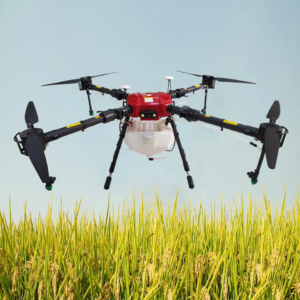
The agricultural sector is constantly evolving to meet the increasing demands for food production, sustainability, and efficiency. One of the most promising advancements in modern agriculture is the use of drones. Airober, a leading innovator in drone technology, is pushing the boundaries of what’s possible with their Hydrogen Energy Management System (EMS). This cutting-edge technology promises to revolutionize agricultural practices, offering enhanced capabilities and greater efficiency than traditional methods.
The Role of Drones in Modern Agriculture
Drones have become invaluable tools in agriculture, providing farmers with the ability to monitor crops, assess field conditions, and manage resources more effectively. Traditional battery-powered drones, however, face limitations in flight time and payload capacity, restricting their utility. Airober’s Hydrogen EMS drones address these challenges, offering extended flight durations, increased payload capacities, and a sustainable energy solution that is perfectly suited for the demands of modern farming.
How Airober’s Hydrogen EMS Enhances Agricultural Practices
- Extended Flight Times for Comprehensive Monitoring: Airober’s Hydrogen EMS drones can stay airborne significantly longer than their battery-powered counterparts. This extended flight time allows for comprehensive monitoring of large agricultural fields in a single flight. Farmers can gather more data in less time, improving the efficiency of crop monitoring and reducing the need for multiple drone deployments.
- Higher Payload Capacity for Advanced Sensors: The increased payload capacity of Hydrogen EMS drones enables them to carry advanced sensors and imaging equipment. These tools can capture high-resolution images and gather detailed data on crop health, soil conditions, and pest infestations. This data is crucial for making informed decisions about crop management, irrigation, and pest control.
- Precision Agriculture with Real-Time Data: Airober’s Hydrogen EMS drones provide real-time data that can be used to implement precision agriculture techniques. Farmers can apply fertilizers, pesticides, and water precisely where they are needed, reducing waste and optimizing resource usage. This precision helps in maintaining healthy crops and improving yields.
- Environmental Monitoring and Sustainability: Sustainability is a key concern in agriculture. Airober’s Hydrogen EMS drones produce zero emissions, making them an environmentally friendly option. Additionally, they can monitor environmental factors such as soil moisture, air quality, and weather conditions, providing valuable data that can help farmers adopt more sustainable practices.
- Enhanced Livestock Management: Beyond crop management, Airober’s Hydrogen EMS drones can also be used for livestock monitoring. They can track the movement and health of animals, ensuring that they are well-cared for and reducing the risk of disease outbreaks. This capability is particularly valuable in large-scale farming operations where manual monitoring is challenging.
Case Study: Airober’s Hydrogen EMS Drones in Action
A real-world example of the impact of Airober’s Hydrogen EMS drones can be seen in a pilot project conducted on a large agricultural farm. The farm faced challenges in monitoring its extensive crop fields and managing irrigation efficiently. By deploying Airober’s Hydrogen EMS drones, the farm was able to:
- Reduce Monitoring Time: The extended flight time of the drones allowed the entire farm to be surveyed in a single flight, significantly reducing the time required for monitoring.
- Optimize Irrigation: Real-time data on soil moisture levels enabled the farm to implement a precision irrigation system, resulting in water savings and healthier crops.
- Improve Crop Health: Advanced sensors detected early signs of pest infestations and nutrient deficiencies, allowing for timely interventions that improved overall crop health and yield.
The Future of Agriculture with Hydrogen EMS Drones
The adoption of Airober’s Hydrogen EMS drones represents a significant step forward in the evolution of agriculture. As technology continues to advance, the capabilities of these drones will only increase, offering even greater benefits to farmers. The future of agriculture lies in the integration of advanced technologies like Airober’s Hydrogen EMS, which promise to make farming more efficient, sustainable, and productive.
In conclusion, Airober’s Hydrogen EMS drones are set to transform the agricultural sector by providing extended flight times, increased payload capacities, and sustainable energy solutions. By enabling comprehensive monitoring, precision agriculture, and improved resource management, these drones offer a powerful tool for modern farmers looking to enhance their operations and meet the growing demands of global food production. As the agricultural industry continues to evolve, Airober’s innovative solutions will undoubtedly play a crucial role in shaping the future of farming.

Leave a Reply